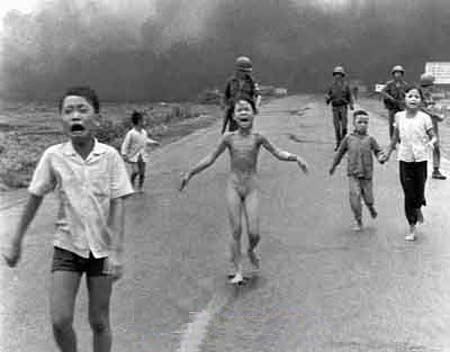 This week marked the 38th anniversary of the American ground withdrawal from
Vietnam. At the time The Spectator ran the following leader, condemning the Pentagon’s often inhuman conduct of the war, which it deemed counter-productive. Reading the piece, it becomes
plain that the conduct of war has changed beyond recognition. Modern strategists have dispensed with napalm and have embraced aid and development instead. Whatever Julian Assange might intimate,
Afghanistan is emphatically not a re-run of Vietnam.
This week marked the 38th anniversary of the American ground withdrawal from
Vietnam. At the time The Spectator ran the following leader, condemning the Pentagon’s often inhuman conduct of the war, which it deemed counter-productive. Reading the piece, it becomes
plain that the conduct of war has changed beyond recognition. Modern strategists have dispensed with napalm and have embraced aid and development instead. Whatever Julian Assange might intimate,
Afghanistan is emphatically not a re-run of Vietnam.
‘Thinking About War
The more our think tank men think about war, the worse our wars become. Sophistication means worse. Men thinking in tanks brood upon killing trees. We know it is silly: but the activity continues. The latest reports emerging out of Washington discuss the pros and cons of defoliation through herbicides in the context of a Russian invasion through the main European gap “between Liege and Mainz and Bonn and Kassel”. This is the corridor used by Germany in the last war. The kind of arguing which yields reassuring and comfortable conclusions goes thus (quoting from an American strategic studies group):
“Because the effect of herbicides is to expose enemy positions while the defender remains concealed in foliage herbicides have the effect of creating a prepared position…In an defensive posture the effect of herbicides is to increase the days of delay achieved in a sector… In conventional (linear) military conflicts, herbicides (when applied early enough) can yield, at most, localised reductions in force requirements. The estimated reductions in force requirement along an entire front and in depth are small.”
These arm-chair strategists go-on to declare; and, having examined the experimental results obtained in the Vietnamese laboratory, the strategists’ conclusions are:
“Herbicides were useful in supporting military operations in RVN (South Vietnam) in selected instances…Herbicides helped to prevent ambushes near roads and waterways and around
military bases. At most, the crop destruction programme harassed the enemy…There was evidence that defoliation reduced the number of men needed in some areas. The herbicide programme in
South Vietnam has been inexpensive when judged against military systems in general.”
Poisoning trees is, of course, better than poisoning people. But the style of thinking is the same; and it will do no harm to realise this.
The suspicion grows that the United States has deliberately bombed North Vietnam’s dykes and it has experimented with pilotless aircraft. In its conduct of the Vietnam War the Pentagon has not demonstrated any particular squeamishness; and the Defence Secretary, Mr Laird, will not find it difficult to reconcile that war with his advice to Republicans to reject “the policies of planned weakness, of white flag waving, of the beginning of the abandonment of the nation’s role in helping to maintain peace.” President Nixon’s determination to end the Vietnam war may not be popular in the Pentagon; or, indeed, in those think-tanks where calculations to do with suffering and with personal responsibility do not enter. But Mr Kissinger’s visit to Vietnam suggests that the President is eager to seek peace and that he is quite prepared for “the abandonment of the nation’s role in helping to maintain peace” by pursuing war. It would do no harm for President Nixon to inform his Defence Secretary that American policy is to withdraw from Vietnam; and, when that has sunk in, the President could do worse than inquire what the men in the think-tanks think they are doing, and whether they might not be better employed doing something else, or nothing.






Comments